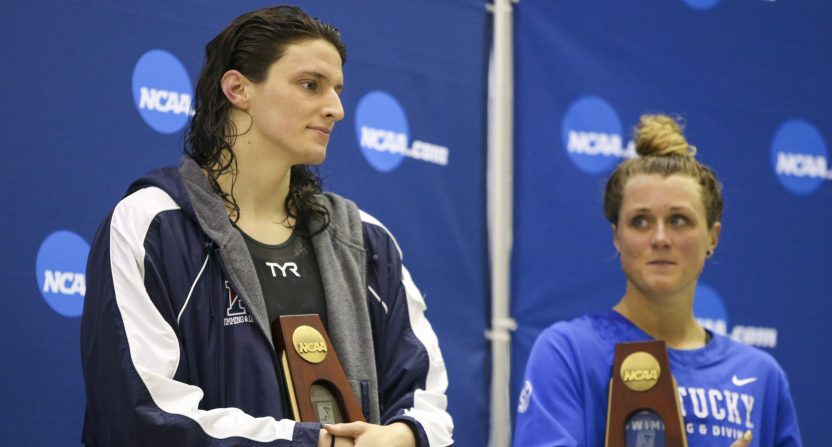FINA, the international federation recognized by the International Olympic Committee for overseeing international competitions for water sports, including swimming, ruled Sunday that it will restrict the participation of transgender athletes in major women’s competitions while also creating a group to establish an “open” category for some events that they can participate in.
The new policy does, however, allow transgender athletes who completed their transition by the age of 12 to compete in women’s competitions.
“This is not saying that people are encouraged to transition by the age of 12. It’s what the scientists are saying, that if you transition after the start of puberty, you have an advantage, which is unfair,” James Pearce, the spokesperson for FINA president Husain Al-Musallam, told The Associated Press. “They’re not saying everyone should transition by age 11; that’s ridiculous. You can’t transition by that age in most countries, and hopefully, you wouldn’t be encouraged to. Basically, what they’re saying is that it is not feasible for people who have transitioned to compete without having an advantage.”
The World Professional Association for Transgender Health’s recommended minimum age for starting gender-transition hormone treatment is 14.
The decision directly impacts Lia Thomas, who became the first openly transgender woman to win an NCAA Division I women’s swimming title this past year. She responded to the news by saying the new policy discriminates against transgender athletes.
“The new FINA release is deeply upsetting,” said Thomas. “It is discriminatory and will only serve to harm all women.”
Meanwhile, University of Kentucky swimmer Riley Gaines, who competed against Thomas, said that the decision is a step in the right direction in an interview with Dana Perino of Fox News.
“It’s definitely a step in the right direction,” Gaines told co-host Dana Perino. “I think this is kind of the first large governing body that has prioritized fairness in women’s sports, and so while it’s not everything, it’s definitely a bold first step and a step in the right direction.
“This is something that women have fought so hard for, for so long, 50 years to get equal opportunities and to have that kind of taken from you and to go a complete 180 from that, it’s really just a slap in the face, not only for myself, but like I mentioned, past female athletes and definitely future female athletes as well.”
Australian Olympic champion Cate Campbell also voiced support for the decision.
“I am asking everyone to take a breath, to absorb before reacting,” said Campbell, via The Guardian. “Listen to the science and experts. Listen to the people who stand up here and tell you how difficult it has been to reconcile inclusion and fairness.
“That men and women are physiologically different cannot be disputed. We are only now beginning to explore and understand the origins of these physiological differences and the lasting effects of exposure to differing hormones.
“Women, who have fought long and hard to be included and seen as equals in sport, can only do so because of the gender category distinction. To remove that distinction would be to the detriment of female athletes everywhere.”
Fellow Australian swimmer Maddie Groves pushed back on Campbell’s thoughts via Twitter, saying the ruling is “discriminatory and unscientific.”
This decision will have some major reactions and pushback in the days ahead as the sport, and the world, navigate the best way forward.
[ESPN]
